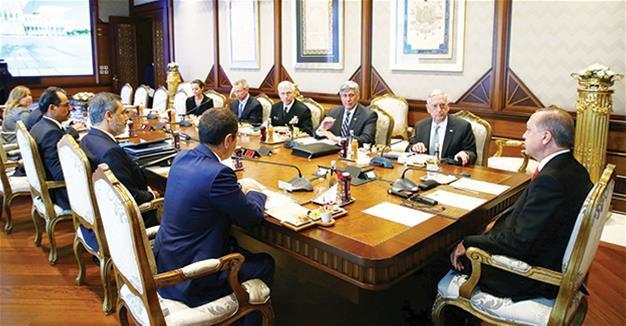Erdoğan conveys ‘unease’ to Mattis over US backing for PYD
Sevil Erkuş - ANKARA
 The U.S.’s ongoing support for the Syrian Kurdish People’s Protection Units (YPG) in the fight against the Islamic State of Iraq and the Levant (ISIL) dominated Pentagon chief Jim Mattis’s talks in Ankara on Aug. 23, with President Recep Tayyip Erdoğan complaining about Washington’s policy, a Turkish official has told the Hürriyet Daily News.
The U.S.’s ongoing support for the Syrian Kurdish People’s Protection Units (YPG) in the fight against the Islamic State of Iraq and the Levant (ISIL) dominated Pentagon chief Jim Mattis’s talks in Ankara on Aug. 23, with President Recep Tayyip Erdoğan complaining about Washington’s policy, a Turkish official has told the Hürriyet Daily News. In talks with Mattis, Ankara reportedly expressed unease over increasing armed support from the U.S. to the YPG fighters, who Ankara sees as being closely linked to the outlawed Kurdistan Workers’ Party (PKK).
Mattis sought to assuage Turkey’s security concerns, said the official, speaking on condition of anonymity.
The official referred to the fact that the U.S.’s special envoy for the anti-ISIL coalition, Brett McGurk, who drew condemnation from the Turkish government over his “proximity” to the YPG fighters, was absent from the American delegation during the talks in Ankara, despite the fact that he accompanied Mattis for discussions in Iraq the previous day.
Mattis met President Recep Tayyip Erdoğan and also had talks with Defense Minister Nurettin Canikli.
The U.S. promised Turkey to provide the serial number and delivery addresses of all arms sent to the YPG, as Turkey said it would monitor the process, presidential sources told the Hürriyet Daily News.
Turkey stressed that Arabs should be administer Raqqa, not Kurds, after the city is totally cleared of ISIL, a stance that the U.S. also agrees with, they added.
The “joint struggle” against the PKK in the Kandil and Sinjar regions in northern Iraq and cooperation on the defense industry were also on the agenda, presidential sources stated, with the parties agreeing on closer cooperation between security units on the issue.
Erdoğan urged Mattis to pledge U.S. support for the trilateral mechanism formed by Turkey, Russia and Iran aiming to establish de-escalation zones in Syria, sources stated.
The two sides also agreed on protecting the territorial integrity of Syria and Iraq and on the continued presence of Turkish military units in Afghanistan.
Erdoğan stressed that a referendum for independence by Iraqi Kurdish administration would be a wrong step, according to presidential sources, adding that the issues of Iran and Russia were not discussed during the meeting.
Mattis flew in to Ankara for the one-day visit after stopping in Iraq to review progress in the campaign against the ISIL, urging coalition partners to prevent other political issues from disrupting the growing momentum against the jihadists.
Following the end of battle for Mosul last month, Iraqi forces, along with Shia militants, launched a ground operation to retake Tal Afar from ISIL. Ankara previously voiced opposition to the participation of Iraq’s Hashd Al-Shaabi, an umbrella group dominated by Shiite forces that Turkey considers a “terrorist” entity.
Washington’s arming of the YPG has strained ties between the NATO allies, as Turkey regards the group as the Syrian affiliate of the PKK but the U.S. has been impressed by its ability to combat ISIL on the ground.
Turkey, a key NATO ally of the U.S. and part of the coalition fighting the ISIL militants, is incensed that Washington has been arming the YPG in offensive into the jihadists’ stronghold of Raqqa which is moving to the final phase.
In May, the Pentagon said it had begun transferring small arms and vehicles to the YPG to support its role as a leading player in the Syrian Democratic Forces (SDF), a Kurdish-Syrian Arab alliance fighting ISIL. The weapons include AK-47s and small-caliber machine guns.
With Turkey agreeing to ramp up sharing of intelligence against terrorist groups, the Iranian chief of staff paid an historic visit to Ankara last week, one week before the visit of Mattis. Meanwhile, Turkey and Russia are believed to be ready to finalize a deal for purchase of Russian S-400 missile defense systems.
















